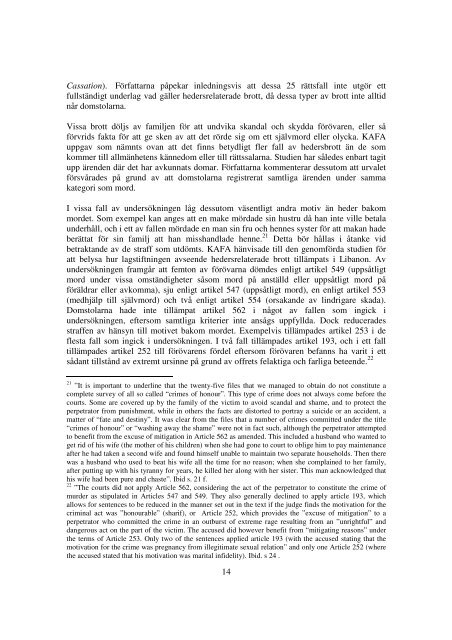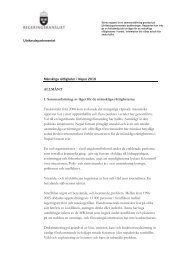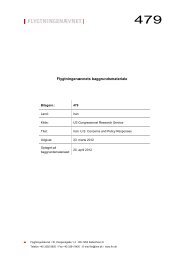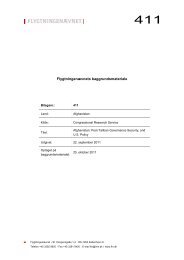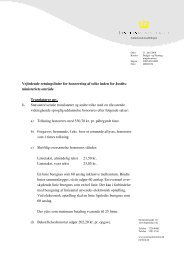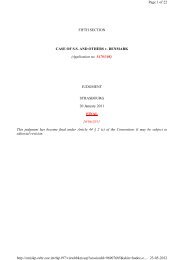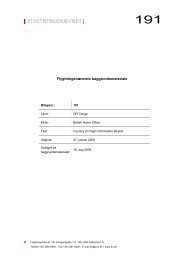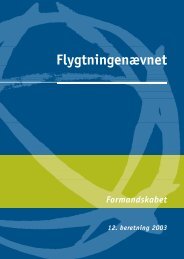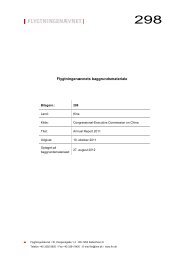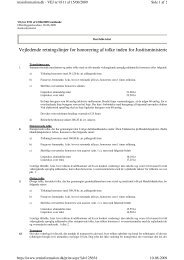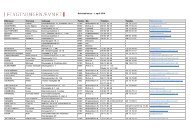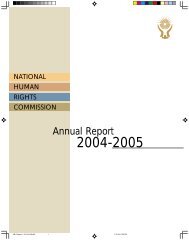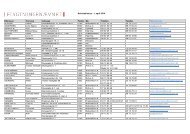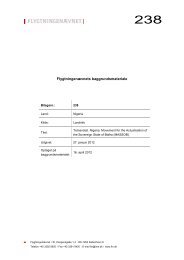Flygtningenævnets baggrundsmateriale
Flygtningenævnets baggrundsmateriale
Flygtningenævnets baggrundsmateriale
Create successful ePaper yourself
Turn your PDF publications into a flip-book with our unique Google optimized e-Paper software.
Cassation). Författarna påpekar inledningsvis att dessa 25 rättsfall inte utgör ett<br />
fullständigt underlag vad gäller hedersrelaterade brott, då dessa typer av brott inte alltid<br />
når domstolarna.<br />
Vissa brott döljs av familjen för att undvika skandal och skydda förövaren, eller så<br />
förvrids fakta för att ge sken av att det rörde sig om ett självmord eller olycka. KAFA<br />
uppgav som nämnts ovan att det finns betydligt fler fall av hedersbrott än de som<br />
kommer till allmänhetens kännedom eller till rättssalarna. Studien har således enbart tagit<br />
upp ärenden där det har avkunnats domar. Författarna kommenterar dessutom att urvalet<br />
försvårades på grund av att domstolarna registrerat samtliga ärenden under samma<br />
kategori som mord.<br />
I vissa fall av undersökningen låg dessutom väsentligt andra motiv än heder bakom<br />
mordet. Som exempel kan anges att en make mördade sin hustru då han inte ville betala<br />
underhåll, och i ett av fallen mördade en man sin fru och hennes syster för att makan hade<br />
berättat för sin familj att han misshandlade henne. 21 Detta bör hållas i åtanke vid<br />
betraktande av de straff som utdömts. KAFA hänvisade till den genomförda studien för<br />
att belysa hur lagstiftningen avseende hedersrelaterade brott tillämpats i Libanon. Av<br />
undersökningen framgår att femton av förövarna dömdes enligt artikel 549 (uppsåtligt<br />
mord under vissa omständigheter såsom mord på anställd eller uppsåtligt mord på<br />
föräldrar eller avkomma), sju enligt artikel 547 (uppsåtligt mord), en enligt artikel 553<br />
(medhjälp till självmord) och två enligt artikel 554 (orsakande av lindrigare skada).<br />
Domstolarna hade inte tillämpat artikel 562 i något av fallen som ingick i<br />
undersökningen, eftersom samtliga kriterier inte ansågs uppfyllda. Dock reducerades<br />
straffen av hänsyn till motivet bakom mordet. Exempelvis tillämpades artikel 253 i de<br />
flesta fall som ingick i undersökningen. I två fall tillämpades artikel 193, och i ett fall<br />
tillämpades artikel 252 till förövarens fördel eftersom förövaren befanns ha varit i ett<br />
sådant tillstånd av extremt ursinne på grund av offrets felaktiga och farliga beteende. 22<br />
21 ”It is important to underline that the twenty-five files that we managed to obtain do not constitute a<br />
complete survey of all so called “crimes of honour”. This type of crime does not always come before the<br />
courts. Some are covered up by the family of the victim to avoid scandal and shame, and to protect the<br />
perpetrator from punishment, while in others the facts are distorted to portray a suicide or an accident, a<br />
matter of “fate and destiny”. It was clear from the files that a number of crimes committed under the title<br />
“crimes of honour” or “washing away the shame” were not in fact such, although the perpetrator attempted<br />
to benefit from the excuse of mitigation in Article 562 as amended. This included a husband who wanted to<br />
get rid of his wife (the mother of his children) when she had gone to court to oblige him to pay maintenance<br />
after he had taken a second wife and found himself unable to maintain two separate households. Then there<br />
was a husband who used to beat his wife all the time for no reason; when she complained to her family,<br />
after putting up with his tyranny for years, he killed her along with her sister. This man acknowledged that<br />
his wife had been pure and chaste”. Ibid s. 21 f.<br />
22 ”The courts did not apply Article 562, considering the act of the perpetrator to constitute the crime of<br />
murder as stipulated in Articles 547 and 549. They also generally declined to apply article 193, which<br />
allows for sentences to be reduced in the manner set out in the text if the judge finds the motivation for the<br />
criminal act was ”honourable” (sharif), or Article 252, which provides the ”excuse of mitigation” to a<br />
perpetrator who committed the crime in an outburst of extreme rage resulting from an ”unrightful” and<br />
dangerous act on the part of the victim. The accused did however benefit from “mitigating reasons” under<br />
the terms of Article 253. Only two of the sentences applied article 193 (with the accused stating that the<br />
motivation for the crime was pregnancy from illegitimate sexual relation” and only one Article 252 (where<br />
the accused stated that his motivation was marital infidelity). Ibid. s 24 .<br />
14


